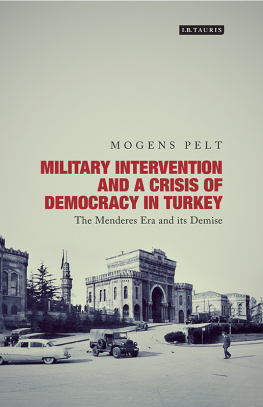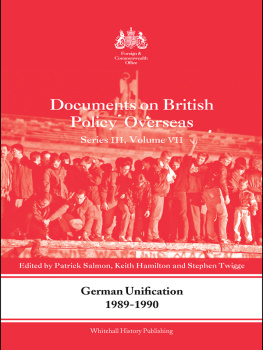First published 2006
by Routledge, an imprint of Taylor & Francis
2 Park Square, Milton Park, Abingdon, Oxon OX14 4RN
Simultaneously published in the USA and Canada
by Routledge
270 Madison Ave, New York, NY 10016
Routledge is an imprint of the Taylor & Francis Group, an informa business
2006 Crown Copyright
All rights reserved. No part of this book may be reprinted or reproduced or utilised in any form or by any electronic, mechanical, or other means, now known or hereafter invented, including photocopying and recording, or in any information storage or retrieval system, without permission in writing from the publishers.
The publisher makes no representation, express or implied, with regard to the accuracy of the information contained in this book and cannot accept any legal responsibility or liability for any errors or omissions that may be made.
Published on behalf of the Whitehall History Publishing Consortium. Applications to reproduce Crown copyright protected material in this publication should be submitted in writing to: HMSO, Copyright Unit, St Clements House, 2-16 Colegate, Norwich NR3 1BQ. Fax: 01603 723000. E-mail:
Publishers note
This book has been produced from camera-ready copy supplied by the author.
British Library Cataloguing in Publication Data
A catalogue record for this book is available from the British Library
Library of Congress Cataloging in Publication Data
A catalog record for this book has been requested
ISBN10: 0714651141 (hbk)
ISBN10: 0203496272 (ebk)
ISBN13: 9780714651149 (hbk)
ISBN 13: 9780203496275 (ebk)
DOCUMENTS ON BRITISH POLICY OVERSEAS
Series III, Volume V
The Southern Flank in Crisis, 19731976
WHITEHALL HISTORIES: FOREIGN AND COMMONWEALTH OFFICE PUBLICATIONS
Series Editors: Keith Hamilton and Patrick Salmon
ISSN: 1471-2083
FCO historians are responsible for editing Documents on British Policy Overseas (DBPO) and for overseeing the publication of FCO Internal Histories.
DBPO comprises three series of diplomatic documents, focusing on major themes in foreign policy since 1945, and drawn principally from the records of the Foreign and Commonwealth Office. The latest volumes, published in Series III, contain archival material which would otherwise be unavailable to the public.
FCO Internal Histories are occasional studies by former serving officials, commissioned to provide background information for members of the FCO, to point out possible lessons for the future and to evaluate how well objectives were met in a particular episode or crisis. They are not written for publication, but some Internal Histories, which offer fresh insights into British diplomacy, are now being declassified for publication by Whitehall History Publishing in association with Routledge.
Latest published volumes:
Britain and China, 1945-1950
Documents on British Policy Overseas, Series I, Volume VIII
S.R. Ashton, G. Bennett and K.A. Hamilton (eds)
Britain and the Soviet Union, 1968-1972
Documents on British Policy Overseas, Series III, Volume I
G. Bennett and K.A. Hamilton (eds)
The Conference on Security and Cooperation in Europe, 1972-1975
Documents on British Policy Overseas, Series III, Volume II
G. Bennett and K.A. Hamilton (eds)
Dtente in Europe, 1972-1976
Documents on British Policy Overseas, Series III, Volume III
G. Bennett and K.A. Hamilton (eds)
The Year of Europe: America, Europe and the Energy Crisis, 1972-1974
Documents on British Policy Overseas, Series III, Volume IV
K.A. Hamilton and P. Salmon (eds)
DOCUMENTS ON BRITISH POLICY OVERSEAS
Current Editorial Team
Professor Patrick Salmon, Ph.D. (Head of Historians and Senior Editor)
Keith A. Hamilton, Ph.D. (Senior Editor)
Christopher J. Baxter, M.A., Ph.D.
Alastair Noble, M.A., Ph.D.
PREFACE
Previous Series III volumes have to a large extent focussed upon British diplomacy in a period associated with an easing of East-West tensions in Europe. In the eyes of some observers this dtente signalled the end of the Cold War. But during the mid-1970s members of the North Atlantic Treaty Organisation (NATO) had also to reckon with an increasingly unstable situation on the Alliances southern flank which the Soviet Union seemed likely to exploit to its advantage. The collapse of the Caetano rgime in Portugal, General Francos death in Spain, a coup dtat in Cyprus, followed by Turkeys military intervention and the threat of a Grco-Turkish war, exposed NATOs vulnerability in a region in which Moscow was already expanding its strategic presence. Moreover, while in France and Italy Communist parties appeared set to make electoral gains, the prospective demise of Marshal Tito, Yugoslavias ageing communist President, encouraged speculation over the consequences of domestic dissension in the Balkans. The British Government was, as the documents in this volume reveal, far from averse to all political change in southern Europe. Dictatorships in Portugal and Greece were regarded by Ministers as an embarrassment to NATO, and for many in Britain, particularly those on the political left, General Franco remained an unhappy reminder of events of an earlier decade. The transition from authoritarian rule to democracy nonetheless required careful handling: the revolution in Portugal seemed at one stage destined to end in rule by a pro-Soviet cabal, and Labour politicians in Britain were distinctly cautious in responding to the gradualist approach adopted by General Francos successors towards the reform process in Spain. In the case of Greece, the restoration of democracy was intimately connected with developments in Cyprus, and was regarded in London as one of the few favourable results of a conflict which British diplomats strove to contain and, far less successfully, to resolve.
Cyprus: Prelude to Crisis
British policy towards Cyprus during 197375, the main theme of the first three chapters of this volume, was conditioned by Britains historic links with the island, the presence of British forces there, and commitments undertaken when the Republic of Cyprus was established in 1960. Cyprus had achieved its independence from Britain after an armed struggle waged by elements of the ethnic Greek population of the island with the aim of securing union (enosis) with Greece. This was opposed by the islands Turkish Cypriot minority, who had come to favour partition (taksim) as an alternative to continued British rule. But the settlement resulting from the Zurich and London accords of February 1959, and elaborated in the Republics Constitution and three treatiesthe Treaty of Guarantee, the Treaty of Establishment and the Treaty of Allianceall of which came into operation on 16 August 1960, represented a compromise between the divergent aspirations of the Greek and Turkish Cypriot communities, and the political and strategic interests of Britain, Greece and Turkey. The latter three powers jointly guaranteed the Republics independence and integrity and the state of affairs established by the Basic Articles of the Constitution. HMG also retained, under the Treaty of Establishment, two Sovereign Base Areas (SBAs) at Akrotiri and Dhekelia along with certain military rights and facilities on the territory of the Republic. And the Treaty of Alliance amongst Greece, Turkey and Cyprus provided for the establishment of a tripartite headquarters on the island, with military contingents of 950 Greeks and 650 Turks for the Republics defence and the training of its army.










